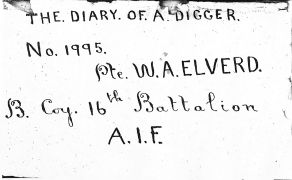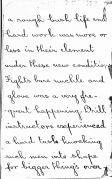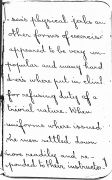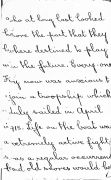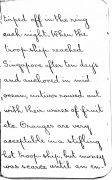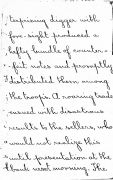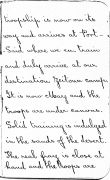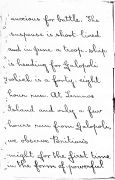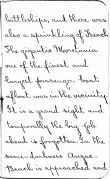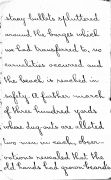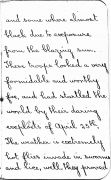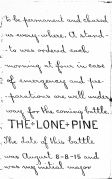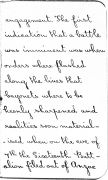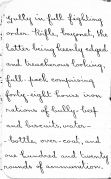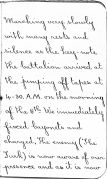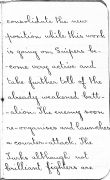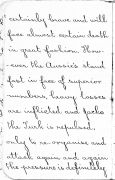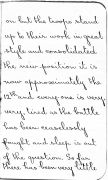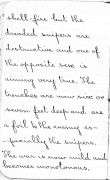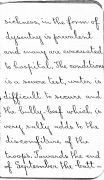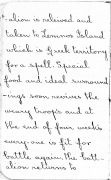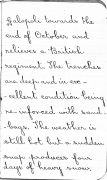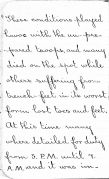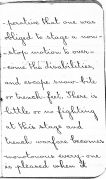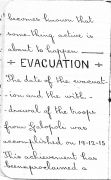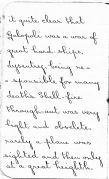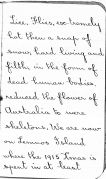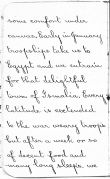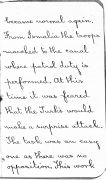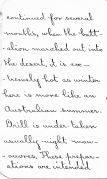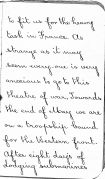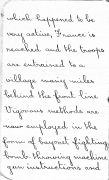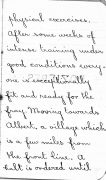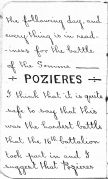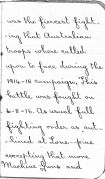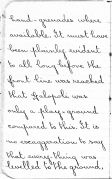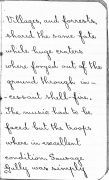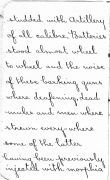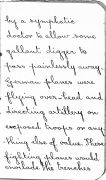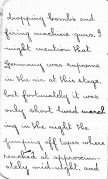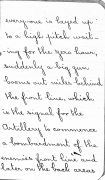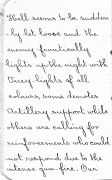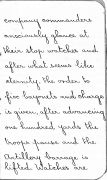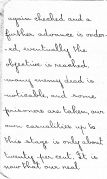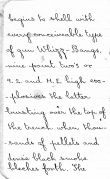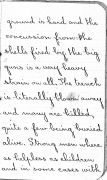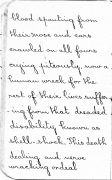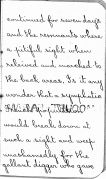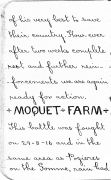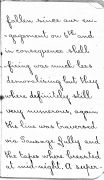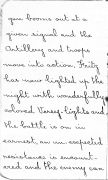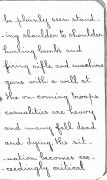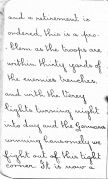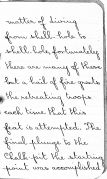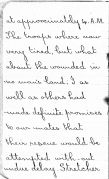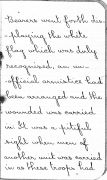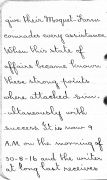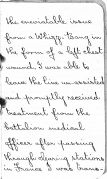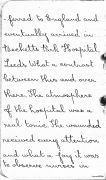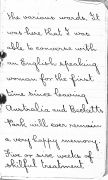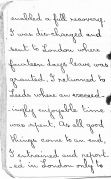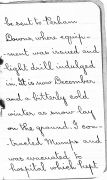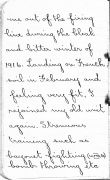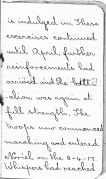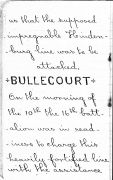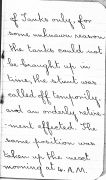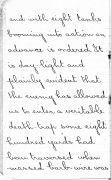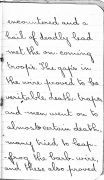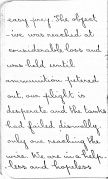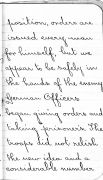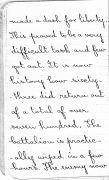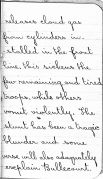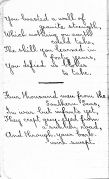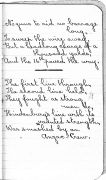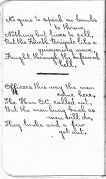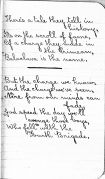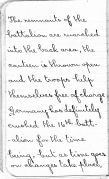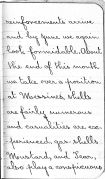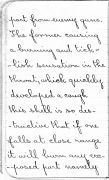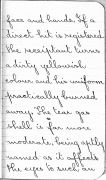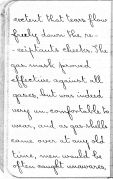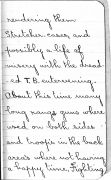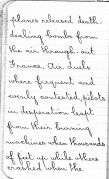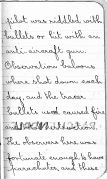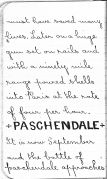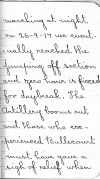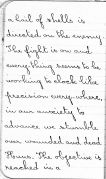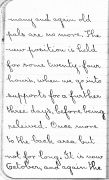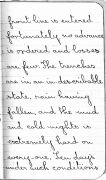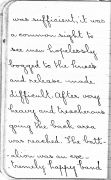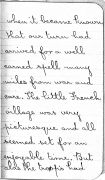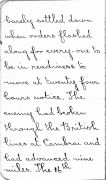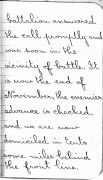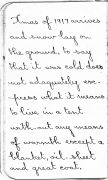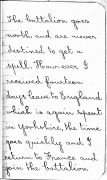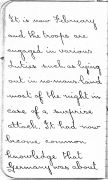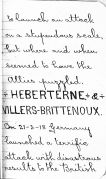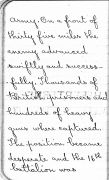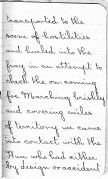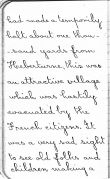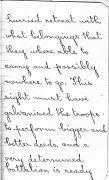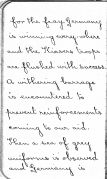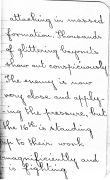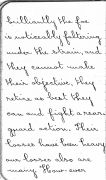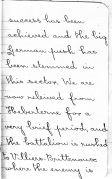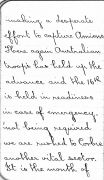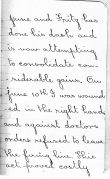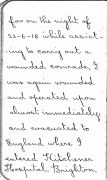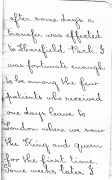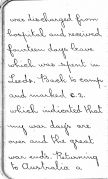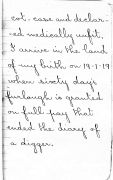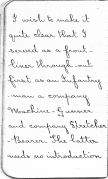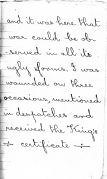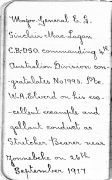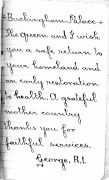ELVERD, William Augustus - 1995
| Original items held by the Army Museum of Western Australia |
| Conflict | World War 1 |
|---|---|
| Service Arm | Australian Imperial Force |
| Unit | 16th Infantry Battalion, B Company |
| Service No. | 1995 |
| Service Arm | Army |
| Date of Birth | 1890 |
| Birthplace | Kojonup, WA |
| Residence | Kojonup, WA |
| Date of Death | 11 Jul 1960 |
| Relatives | Mother - Rose Elverd |
The Diary of a Digger - part 1
The dairy of a Digger No. 1995
Private W.A. Elverd
B Coy 16th Battalion A.I.F.
Enlisting
I enlisted at Collie in W.A. on January 15-1-15 at the age of 24 1/2 years and found conditions at Black-boy Camp suitable to any-one who desired a rough life and the possibility of doubtful experiences. So the man who had previously experienced a rough bush life and hard work was more or less in their element in these new conditions. Fights, bare knuckle and glove, was a very frequent happening. Drill instructors experienced a hard task knocking such men into shape for bigger things over-seas, physical jerks and other forms of exercise appeared to be very unpopular and many hard liners were put in clink for refusing duty of a trivial nature. When uniforms were issued the men settled down more readily and responded to their instructors & who at long last looked more the part that they were destined to play in the future. Every-one by now was anxious to join a troopship which duly sailed in April 1915. Life on the boat was extremely active, fights was a regular occurrence and old scores would be wiped off in the ring each night. When the troop-ship reached Singapore after ten days and anchored in mid ocean, natives rowed out with their wares of fruit etc. Oranges are very acceptable in a stifling hot troop-ship, but money was scarce until an enterprising digger with fore-sight produced a hefty bundle of counterfeit notes and promptly distributed them among the troops. A roaring trade ensued with disastrous results to the sellers, who would not realize this until presentation at the bank the next morning. The troopship is now on its way and arrives at Port Said where we entrain and duly arrive at our destination Zeitoun camp. It is now May and the troops are under canvas. Solid training is indulged in the sands of the desert. The real fray is close at hand and the troops are anxious for battle. The suspense is short lived and in June a troop-ship is heading for Gallipoli which is a forty-eight hour run. At Lemnos Island and only a few hours run from Gallipoli, we observe Britain's might for the first time in the form of powerful battleships, and there was also a sprinkling of French. The gigantic Moretania, one of the finest and largest passenger boats afloat, was in the vicinity. It is a grand sight and temporarily the big job ahead is forgotten. In the semi-darkness Anzac Beach is approached and stray bullets spluttered around the barges which we had transferred to, no casualties occured and the beach is reached in safety. A further march of three hundred yards where dug-outs are alloted two men in each, observations revealed that the old hands had grown beard's and some were almost black due to exposure to the blazing sun. These troops looked a very formidable and worthy foe, and had startled the world by their daring exploits of April 25th. The weather is extremely hot, flies invade in swarms and lice, well, they proved to be permanent and chased us everywhere. A stand-to was ordered each morning at four in case of emergency and preparations are well under way for the coming battle.
THE LONE PINE
The date of this battle was 8-8-15 and was my initial major engagement. The first indication that a battle was imminent was when orders were flashed along the lines that bayonets were to be keenly sharpened and realities soon materialised when on the eve of the 7th the Sixteenth Battalion filed out of Anzac Gully in full fighting order. Rifle, bayonet, the latter being keenly edged and treacherous looking, full-pack comprising forty-eight hours iron rations of bully-beef and biscuits, water-bottle, over-coat, and one hundred and twenty rounds of ammunition. Marching very slowly with many rests and silence as the key-note, the battalion arrived at the jumping off tapes at 4.30 A.M. on the morning of the 8th. We immediately fixed bayonets and charged. The enemy (The Turk) is now aware of our presence and as it is now consolidate the new position while this work is going on, Snipers become very active and take further toll of the already weakened battalion. The enemy soon re-organises and launches a counter-attack. The Turks although not brilliant fighters are certainly brave and will face almost certain death in great fashion. However the Aussies stand fast in face of superior numbers, heavy losses are inflicted and Jacko the Turk is repulsed, only to re-organise and attack again and again the pressure is certainly on but the troops stand up to their work in great style and consolidated the new position. It is approximately the 12th and every-one is very, very, tired as the battle has been ceaselessly fought and sleep is out of the question. So far there has been very little shell-fire but the dreaded snipers are destructive and one of the opposite sex is aiming vey true. The trenches are now six or seven feet deep and are a foil to the enemy especially the snipers. The war is now mild and becomes monotonous, sickness in the form of dysentry is prevalent and many are evacuated to hospital. The conditions is a severe test, water is difficult to secure and the bully-beef which is very salty adds to the discomfort of the troops. Towards the end of September the battalion is relieved and taked to Lemnos Island which is Greek territory for a spell. Special food and ideal surroundings soon revives the weary troops and at the end of four weeks everyone is fit for battle again. The battalion returns to Gallipoli towards the end of October and relieves a British regiment. The trenches are deep and in excellent condition being reinforced with sandbags. The weather is still hot but a sudden snap produces four days of snow. These conditions played havoc with the unprepared troops, and many died on the spot while others suffering from trench-feet in its worst form lost toes and feet. At this time many were detailed for duty from 5P.M. until 7A.M. and it was imperative that one was obliged to stage a non-stop motion to overcome the disabilities and escape snow-bite or trench-feet. There is little or no fighting at this stage and trench warfare becomes monotonous every-one is pleased when it becomes known that something is about to happen.
EVACUATION
The date of the evacuation and the withdrawal of the troops from Gallipoli was accomplished on 19-12-15. This achievement has been proclaimed a master-piece of strategy and so well and smoothly did plans carry that I am afraid very little is left for me to say, as the troops simply walked out of the trenches, and safely onto the boats. A very fine tribute to our leaders. I wish to make it quite clear that Gallipoli was a war of great hard-ships, dysentry being responsible for many deaths. Shell-fire throughout was very light and obsolete, rarely a plane was sighted and then only at a great height. Lice, flies, extremely hot then a snap of snow, hard living and filth, in the form of dead human bodies, reduced the flower of Australia to mere skeletons. We are now on Lemnos Island where the 1915 Xmas is spent in at least
The Diary of a Digger - part 2
some comfort under canvas. Early in January troopships take us to Egypt and we entrain for that delightful town
of Ismalia. Every latitude is extended to the war weary troops but after a week or so of decent food and many long sleeps, we become
normal again. From Ismalia the troops marched to the canal where patrol duty is performed. At this time it was feared the Turks would
make a surprise attack. The task was an easy one as there was no opposition. This work continued for several months, when the battalion
marched out into the desert. It is extremely hot as winter here is more like an Australian summer. Drill is under-taken usually night
manouvres. These preparations are intended to fit us for the heavy task in France. As strange as it may seem every-one is very anxious to
go to this Theatre of war. Towards the end of May we are troop-ship bound for the Western front. After eight days of dodging submarines
which happened to be very active, France is reached and the troops are entrained to a village many miles behind the front line. Vigorous
methods are now employed in the form of bayonet fighting, bomb-throwing, machine gun instructions and physical exercises. After some weeks
of intense training under good conditions every-one is exceptionally fit and ready for the fray. Moving towards Albert, a village which is
a few miles from the front line. A halt is ordered until the following day, and everything is in readiness for the battle of the Somme.
POZIERES
I think that it is quite safe to say that this was the hardest battle the 16th Battalion took part in and I suggest that Pozieres was the fiercest fighting that Australian troops were called upon to face during the 1914-18 campaign. This battle was fought on 6-8-16. As usual full fighting order as outlined at Lone-pine excepting that more Machine Guns and hand-grenades were available. It must have been plainly evident to all, long before the front line was reached that Gallipoli was only a play-ground compared to this. It is no exaggeration to say that every-thing was levelled to the ground, villages, and forests, shared the same fate while huge craters where forged out of the ground through incessant shell-fire. The music had to be faced but the troops were in excellent condition. Sausage Gully was simply studded with Artillery of all calibre. Batteries stood almost wheel to wheel and the noise of these barking guns were deafening, dead mules and men were strewn every-where some of the latter having been previously injected with morphia by a sympathetic doctor to allow some gallant digger to pass painlessly away. German planes were flying over-head and directing artillery on exposed troops or anything else of value. These fighting planes would envilade the trenches dropping bombs and firing machine-guns. I might mention that Germany was supreme in the air at this stage, but fortunately it was only short lived marching in the night the jumping off tapes where reached at approximately mid-night, and every-one is keyed up to a high pitch waiting for the zero hour, suddenly a big gun booms out miles behind the front line, which is the signal for the Artillery to commence a bombardment of the enemy's front line and later on the back areas. Hell seems to be suddenly let loose and the enemy frantically lights up the night with Verey lights of all colours, some denotes Artillery support while others are calling for reinforcements who could not repond due to the intense gun-fire. Our company commanders anxiously glance at their stop watches and after what seems like eternity, the order to fix bayonets and charge is given, after advancing one hundred yards the troops pause and the Artillery barrage is lifted. Watches are again checked and a further advance is ordered, eventually the objective is reached, many enemy dead are noticable and some prisoners are taken, our own casualties up to this stage are only about twenty per cent. It is now that our real - begins to shell with every conceivable type of gun, Whizz-Bangs, nine-point two's or 9.2 and H.E. explosives, the latter bursting over the top of the trench when thousands of pellets and dense black smoke belches forward. The ground is hard and the concussion from the shells fired by the big guns is a very heavy strain on all. The trench is literally blown away and many are killed, quite a few being buried alive. Strong men were as helpless as children and in some cases with blood spouting from their nose and ears crawled on all fours crying piteously, now a human wreck for the rest of their lives suffering from that dreaded disability known as shell-shock. This death dealing and nerve wracking ordeal continued for seven days and the remanants were a pitiful sight when relieved and marched to the back areas. Is it any wonder that a sympathetic French population would break down at such a sight and weep unashamedly for the gallant digger who gave of his very best to save their country. However after two weeks complete rest and further reinforcements we are again ready for action.
MORQUET FARM
This battle was fought on 29-8-16 and in the same area as Pozieres on the Somme, rain had fallen since our engagament on 6th and in consequence shell-firing was much less demoralising but they were definitely still very numerous, again the line was traversed via Sausage Gully and the tapes were breasted at mid-night. A super-gun booms out at a given signal and the Artillery and troops move into action. Fritz now has lighted up the night with wonderfully colored Verey-lights and the battle is on in earnest, an unexpected resistance is encountered and the enemy can be plainly seen standing shoulder to shoulder hurling bombs and firing rifle and machine guns with a will at the oncoming troops. Casualties are heavy and many fall dead and dying, the situation becomes exceedingly critical and a retirement is ordered, this is a problem as the troops are within thirty yards of the enemy's trenches, and with the Verey lights turning night into day and the Germans winning hansomely we fight out of this difficult corner. It is now a matter of diving from shell-hole to shell-hole, fortunately there are many of these but a hail of fire greets the retreating troops each time that this feat is attempted. The final plunge to Chalk-pit, the starting point, was accomplished at approximately 4.A.M. The troops were now very tired, but what about the wounded in no man's land. I as well as others had made definite promises to our mates that their rescue would be attempted without undue delay. Stretcher Bearers went forth displaying the white flag which was duly recognised, an unofficial armistice had been arranged and the wounded was carried in. It was a pitiful sight when men of another unit were carried in as these troops had given their Moquet-Farm comrades every assistance. When this state of affairs became known these strong points where attacked simultaneously with success. It is now 9.A.M. on the morning of 30-8-16 and the writer at long last receives
The Diary of a Digger - part 3
the inevitable issue from a Whizz-Bang in the form of a left chest wound. I was able to leave the line unassisted and promptly received
treatment from the battalion medical officer. After passing through clearing stations in France I was transferred to England and eventually
arrived in Becketts Park Hospital, Leeds. What a contrast between this and over there. The atmosphere of the hospital was a real tonic.
The wounded received every attention and what a joy it was to observe nurses in the various wards. It was here that I was able to converse
with an English speaking woman for the first time since leaving Australia and Becketts Park will ever remain a very happy memory. Five or
six weeks of skilful treament enabled a full recovery. I was discharged and sent to London where fourteen days leave was granted. I
returned to Leeds where an exceedingly enjoyable time was spent. As all good things come to an end, I entrained and reported in London
only to be sent to Perham Downs, where equipment was issued and light drill indulged in. It is now December and a bitterly cold winter as
snow lay on the ground. I contracted Mumps and was evacuated to hospital which kept me out of the firing line during the bleak and bitter
winter of 1916. Landing on French soil in February and feeling very fit, I rejoined my old unit again. Strenuous training such as bayonet
fighting (was) bomb-throwing etc is indulged in. These exercises continued until April. Further reinforcements had arrived and the
battalion was again at full strength. The troops now commenced marching and entered Noriel on 18-4-17. Whispers had reached us that the
supposed impregnable Hindenburg Line was to be attacked.
BULLECOURT
On the morning of the 10th, the 16th Battalion was in readiness to charge this heavily fortified line with the assistance of Tanks. Only, for some unknown reason, the tanks could not be brought up in time, the stunt was called off temporarily, and an orderly retirement effected. The same position was taken up the next morning at 4.A.M. and with eight tanks booming into action an advance is ordered. It is day-light and plainly evident that the enemy has allowed us to enter a veritable death-trap. Some eight hundred yards had been traversed when massed barb-wire was encounterd and a hail of deadly lead met the on-coming troops. The gaps in the wire proved to be veritable death-traps, and men went on to almost certain death, many tried to leap-frog the barb-wire, and these also proved easy prey. The objective was reached at considerable loss and was held until ammunition petered out, our plight is desperate and the tanks had failed dismally, only one reaching the wire. We are in a helpless and hopeless position, orders are issued every man for himself, but we appear to be safely in the hands of the enemy. German Officers began giving orders and taking prisoners. The troops did not relish the new idea and a considerable number made a dash for liberty. This proved to be a very difficult task and very few got out. It is now history how sixty-three did return out of a total of over seven hundred. The battalion is practically wiped in a few hours. The enemy now releases cloud gas from cylinders installed in the front line, this sickens the few remaining and tired troops, while others vomit violently. The stunt has been a tragic blunder and some verse will also adaquately explain Bullecourt.
You boasted of a wall of granite strength,
Which nothing on earth could take,
The skill you learned in forty years,
You defied us blokes to take.
Four thousand men from the Southern Seas,
In war but infants yet,
They crept grey-eyed from a sunken road,
And through your barb-wire swept.
No guns to aid no barrage long,
To sweep the wire away,
But a headlong charge of a thousand yards,
And the 16th paved the way.
The first line through,
The second line held
They fought as strong men do,
Hindenburg's Line witb its vaunted strength,
Was smashed by an Anzac crew.
No guns to speak no bomb's to throw,
Nothing but lives to sell,
But the Fourth Brigade like a quivvering wave,
Fought through the infernal hell.
Oficers this way the men come here,
The Hun O.C. called out,
But the men hung back as men will do,
They broke and a few got out.
There's a tale they tell in history,
Its on the scroll of fame,
Of a charge they made in the Crimean,
Balaclava is the name.
But the charge we know,
And the charge we've seen,
Ne're from our minds can fade,
God speed the day we'll avenge those boys,
Who fell with the Fourth Brigade.
The remnants of the Battalion are marched into the back area, the canteen is thrown open and the troops help themselves free of charge.
Germany has definitely crushed the 16th Battalion for the time being, but as time goes on, changes take place, reinforcements arrive and
by June we again look formidable. About the end of this month we take over a position at Messines, shell's are fairly numerous and
casualties experienced, gas-shells, Mustard and Tear, also play a conspicuous part from enemy guns. The former causing a burning and
ticklish sensation in the throat, which quickly developed a cough. This shell is so destructive that if one falls at close range it will
burn any exposed part namely face and hands. If a direct hit is registered the recipiant turns a dirty yellowish colour and his uniform
practically burns away. The tear gas shell is far more moderate, being aptly named as it affects the eyes to such an extent that tears
flow freely down the recipiants cheeks. The gas-mask proved effective against all gases, but was indeed very uncomfortable to wear, and
as gasshells came over at any old time, men would be often caught unawares, rendering them Stretcher-cases, and possibly a life of misery
with the Dreaded T.B. entervening. About this time many long range guns were used on both sides and troops in the back areas were not
having a happy time. Fighting planes released death-dealing bombs from the air throughout France. Air duals were frequent and evenly
contested, pilots in desperation leapt from their burning machines when thousands of feet up while others crashed when the pilot was
riddled with bullets or hit with an anti-aircraft gun. Observation balloons were shot down each day, and the tracer bullets caused fire
and total destruction. The observers here were fortunate enough to have parachutes, and these must have saved many lives. Later on a huge
gun set on rails and with a ninety mile range poured shells into Paris at the rate of four per hour.
PASCHENDALE
It is now September and the battle of Paschendale approaches. Marching at night on 26-9-17 we eventually reached the jumping off section and zero hour is fixed for daybreak. The Artillery booms out and those who experienced Bullecourt must have gave a sigh of relief when a hail of shells is directed on the enemy. The fight is on and everything seems to be working to clock like precision every-where. In our anxiety to advance we stumble over wounded and dead Huns. The objective is reached in a
The Diary of a Digger - part 4
spectacular manner and many of the enemy are taken prisoners. The German Officers look defiant and do not relish their new position. The
old score at Bullecourt has been more or less wiped off. Never-the-less our killed have been many and again old pals are no more. The new
position is held for some twenty-four hours, when we go into supports for a further three days, before being relieved. Once more to the
back area but not for long. It is now October, and again the front line is entered. Fortunately no advance is ordered and losses are few.
The trenches are in an indescribable state, rain having fallen, and the mud and cold nights is extremely hard on everyone. Ten days
under such conditions was sufficient, it was a common sight to see men hopelessly bogged to the knees and release made difficult. After
very heavy and treacherous going, the back area was reached. The battalion was an extremely happy band when it became known that our turn
had arrived for a well earned spell many miles from war and care. The little French village was very picturesque and all seemed set for a
very enjoyable time. But alas the troops had barely settled down when orders flashed along for everyone to be in readiness to move at
twenty four hours notice. The enemy had broken through the British lines at Cambrai and had advanced nine miles. The 16th Battalion had
answered the call promptly and was soon in the vicinity of battle. It is now the end on November, the enemies advance is checked, and we
are now domiciled in tents some miles behind the front line. Xmas of 1917 arrives and snow lay on the ground, to say that it was cold does
not adequately express what it means to live in a tent without any means of warmth, except a blanket, oil-sheet, and great coat. The
battalion goes north and are never destined to get a spell. However I received fourteen days leave to England, which is again spent in
Yorkshire. The time goes quickly, and I return to France and join the battalion. It is now February and the troops are engaged in various
duties such as lying out in no-mans-land most of the night in case of a surprise attack. It had now become common knowledge that Germany
was about to launch an attack on a stupendous scale, but where and when seemed to have the Allies puzzled.
HEBERTERNE & VILLERS-BRITTENOUX
On 21-3-18 Germany launched a terrific attack with disastrous results to the British Army. On a front of thirty five miles the enemy advanced swiftly and successfully. Thousands of British prisoners and hundreds of heavy guns were captured. The position became desperate and the 16th Battalion was transported to the scene of hostilities and hurled into the fray in an attempt to check the on-coming foe. Marching briskly and covering miles of territory we came into contact with the Hun who, either by design or accident, had made a temporily halt about one thousand yards from Heberturne. This was an attractive village which was hastily evacuated by the French citizens. It was a very sad sight to see old folks and children making a hurried retreat with what belongings that they were able to carry and possibly nowhere to go. This sight must have galvanised the troops to perform bigger and better deeds, and a very determined battalion is ready for the fray. Germany is winning everywhere and the Kiaser's troops are flushed with success. A withering barrage is encountered to prevent reinforcements coming to our aid. Then a sea of grey uniforms is observed and Germany is attacking in massed formation. Thousands of glittering bayonets show out conspicuously. The enemy is now very close and applying the pressure, but the 16th is standing up to their work magnificently and is fighting brilliantly. The foe is noticeably faltering under the strain, and they cannot make their objective, they retire as best they can and fight a rear-guard action. Their losses have been heavy, our losses also are many. However success has been achieved and the big German push has been stemmed in this sector. We are relieved from Heberterne for a very brief period, and the battalion is rushed to Villers-Brittenoux where the enemy is making a desperate effort to capture Amiens. Here again Australian troops have held up the advance and the 16th is held in readiness in case of emergency. Not being required, we are rushed to Corbie, another vital sector. It is the month of June and Fritz has done his dash and is now attempting to consolidate considerable gains. On June 10th I was wounded in the right hand and against doctor's orders refused to leave the firing line. This act proved costly for on the night of 23-6-18 while assisting to carry out a wounded comrade, I was again wounded and operated upon almost immediately and evacuated to England where I entered the Kitchener Hospital, Brighton. After some days a transfer was effected to Harefield Park. I was fortunate enough to be among the few patients who received one days leave to London where we saw the King and Queen for the first time. Some weeks later I was discharged from hospital and received fourteen days leave which was spent in Leeds. Back to camp and marked C.2. which indicated that my war days are over and the great war ends. Returning to Australia a cot-case and declared medically unfit, I arrive in the land of my birth on 19-1-19 when sixty days furlough is granted on full pay that ended the diary of a digger. I wish to make it quite clear that I served as a front-liner through-out, first as an Infantry man a company Machine Gunner and company Stretcher-Bearer. The latter needs no introduction and it was here that war could be observed in all its ugly forms. I was wounded on three occasions, mentioned in despatches and received the King's certificate.
Major-General E.G. Sinclair Mac-Lagan C.B. D.S.O. commanding the 4th Australian Division congratulates No. 1995 Pte W.A. Elverd on his
excellent example and gallant conduct as Stretcher Bearer near Zonnebeke on 26th September 1917
Buckingham-Palace
The Queen and I wish you a safe return to your homeland and an early restoration to health. A grateful mother country thanks you for
faithful services.
George R.I.

